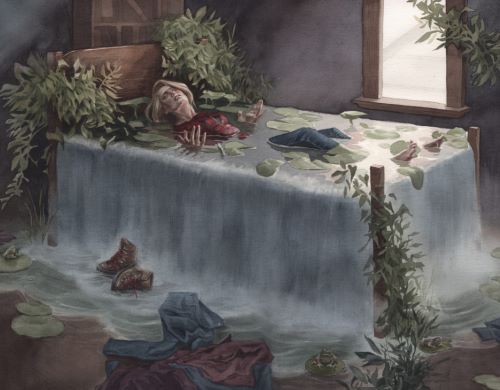i. toca la marcha. mi pecho llora adiós señora. que ya me voy, a mi casita de sololoy As a child, it embarrassed me to see my dolls naked. Sololoy: Phonetic sister of celluloid, used for synthetic playthings. Especially Barbie’s unslit— glossy mound often mimicked but found only in prepubescenee. Of biology, as in cell-body or genome. The first time someone puts their mouthon me, I am not older than six. Accidentally or not, I wet the bed. From Old French celle, meaning room or chamber. I have never known another name for release but shame. Related to Latin celare: to cover or conceal. Around this age, I overhear my grandmother say that children who remain silent are responsible for their own abuse. I confuse the root sol for solus and believe it to mean—little house of soliloquy.ii. ese limar que tienes, cielito lindo, junto a la boca Lunar: a freckle—a slipped decimal, a rounding error. An adult man says he bets I’ll be hot when I’m older. From Latin luna: What is the equation for orbital distance? I am not older than 8 at the time, I was always aimed toward collision.iii. arroz con leche, me quiero casar Casar: to marry. As young girls, my cousin and I find out that our friend is being sexually harassed by her stepfather. With a z, cazar means to chase, hunt, get. When we tell my aunt, she says it’s none of our business what happens in other people’s homes. Without the r, casa means house. Hus, as in husband or hush, is perhaps connected to the root of hide—that is, the skin of an animal.iv. dos y dos son cuatro, cuatro y dos son seis seis y dos son ocho y ocho, dieciséis Once, I tell a therapist, only because there is a required questionnaire. She asks me if I did anything about it. I say no. Two, as in twin, comes from the root dwo, found in double or duplex. This is the first time it occurs to me that if it happens again, it’s on me. Six is twice three: as in six feet under or three hundred and sixty degrees. He has a daughter now. At sixes and sevens, originally cinque and sice, meaning risk or disarray.v. con una viudita de la capital que sepa coser, que sepa bordar “Is she your friend?” A stranger points. Coser: To prick, puncture, stitch. No one at the bar is doing anything except watching, making their slow revolutions around the scene on the dancefloor. Bordar: to circle, hem, fringe. Until someone else claims her, she is his— widow, as in with or without, is related to words such as void or divisible. I am almost grateful for the way boy 2 keeps slipping his palm under the back of my shirt. The Latin vidua, meaning widow, may share the root vid or vis with words such as evidence or invisible. “Yes,” I say, “yes,” although she is not. I don’t know that I would have said anything if I hadn’t been caught —with needle, as in eye, organ of sight. Weaving has always been women’s work—as in jab, cross, or hook.vi. no se lo des a nadie, cielito lindo, que a mi me toca I call her Jessica or Crystal, pull on her arm, and ask her to come to the restroom—something about tampons or lipstick. Her body is limp; his hands up her shirt and gripping her stomach. From Old French toche: attack or blow. I thread my fingers through her elbows—to play, my turn. Boy I gives me a shove—tag, you’re it. My boot catches a beer can and I trip back into orbit. “Let’s go,” boy 2 says. To be in or our of touch. “You can’t negotiate with people like that.” To sound—a bell or drum. He thinks he is different from boy 1. Or was he referring to her? To stroke, grope, prey. I am led into a cab and then a bed. Touché.vii. tengo una muñeca vestida de azul con su camisita y su canesú esta mañanita me dijo el doctor que le dé jarabe con un tenedor Sounds like tender: to have or hold. I roll away from him, onto my side. To divide in branches or go separate ways. He puts something on the TV with a pre-recorded laugh track. Of Old English forca or force, as in rivers or roads. The bedroom floods in flickering blue. I feel his hand on my hip and squirm away. To doctor also means to alter, disguise, foul play. “Are you ticklish?” he laughs, starting for my waist. I know boys do this because it makes a joke out of touching me. A chess attack on two pieces: I am equally afraid to write this as I am to keep it. “No, I’m not.” I want to leave, but the ceiling fan is spinning on its axis so fast that it looks fixed. Every girl has something like this—to fork out or fork over.
Etymology of Latin American Nursery Rhymes
Veronica Silva
Feature Date
- April 13, 2023
Series
Selected By
Share This Poem
Print This Poem
“Etymology of Latin American Nursery Rhymes” from BEST OF THE NET ANTHOLOGY 2023.
Published by Sundress Publications in 2023.
Copyright © 2023 by Veronica Silva.
All rights reserved.
Reproduced by Poetry Daily with permission.
The Best of the Net is an awards-based anthology designed to grant a platform to a diverse and growing collection of writers and publishers who are building an online literary landscape that seeks to break free of traditional publishing. This space has been created to bring greater respect to the continually expanding world of exceptional digital publishing.
Poetry Daily Depends on You
With your support, we make reading the best contemporary poetry a treasured daily experience. Consider a contribution today.




